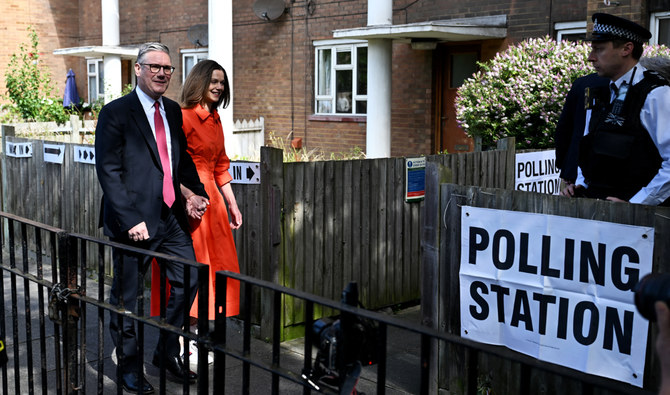LONDON: The first month of a Keir Starmer premiership will be a whirlwind of international diplomacy including meetings with US President Joe Biden and European leaders.
His first steps on the world stage will be just days away, at the NATO 75th anniversary summit being held in Washington next Tuesday to Thursday.
Starmer will then play host at Blenheim Palace, near Oxford, in central England, on July 18, at a European Political Community meeting, with France’s Emmanuel Macron and Germany’s Olaf Scholz expected.
Labour, out of power since 2010, has pledged a foreign policy of “progressive realism,” seeing a more volatile world “as it is not as we would want it to be,” said David Lammy, who is expected to become foreign secretary.
The party has also pledged to “make Brexit work” and seek “an ambitious” security pact with the the European Union.
Here is a rundown of how a Labour government could approach the major international issues it faces.
Labour would undertake a “full audit” across all government departments of the UK’s relationship with China to “set the direction and course” of its China policy, Lammy told reporters this week.
Starmer last year said the UK needed to “wean itself off” China on issues like trade, commerce and technology while acknowledging the importance of being able to cooperate on issues such as tackling climate change.
The challenge will be to balance the UK’s trade and economic interests with security imperatives.
That could be complicated by a possible return of Donald Trump in Washington after the US presidential election in November.
Trump would be expected to ramp up pressure on allies to be tougher with Beijing.
Labour says it is committed to recognizing a Palestinian state “as a contribution to a renewed peace process which results in a two-state solution.”
But it has not set out any timescale for doing so.
Other commitments include pushing for an immediate ceasefire, the release of all hostages and an increase in the amount of aid getting into Gaza.
Starmer has pledged to work with France’s far-right National Rally (RN) party if it wins power.
“I will work with any government in Europe and across the world if we are elected... For me, that’s what serious government is about,” he said.
He said both bilateral deals with France and agreements with the whole EU, which the UK voted to leave in 2016 leading to a messy divorce, were important to address the issue of migrants crossing the Channel in small boats.
Pressed on RN leader Marine Le Pen’s preference for bilateral deals over EU-wide ones, Starmer said the two were not mutually exclusive.
He said existing bilateral agreements with France needed to be strengthened and improved “particularly in relation to smashing the gangs that are running the vile trade of putting people into boats.”
“But there are also EU measures,” he added. “The security agreement we want with the EU when it comes to dealing with smuggling gangs is really important.”
The UK has been one of Kyiv’s staunchest supporters and has provided money, weapons and troop training to help it repel Russia’s invasion.
Labour have stressed continued support for Ukraine if they win, and Starmer would be expected to meet Ukrainian President Volodymyr Zelensky early to reaffirm that message in person.
Starmer has said a meeting with Russian President Vladimir Putin is “simply not an issue” at the moment and described him as “the aggressor in Ukraine.”
“The most important thing is to be absolutely clear that our support for Ukraine is on a united front in this country,” he said.
A strategic defense review would be carried out within the first year of government to set out a path to an increase in defense spending to 2.5 percent of GDP.


























